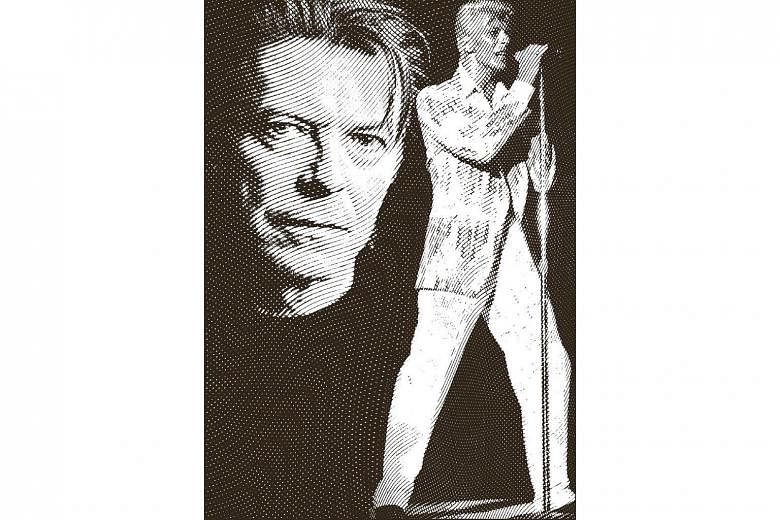This story was first published in The Straits Times on April 13, 2013.
After a 10-year hiatus, the British rock star David Bowie has made a sensational comeback with a new album, The Next Day, and an exhibition at the Victoria and Albert Museum in London.
He is 66 and is obviously in good health. Back in 2004, he suffered a heart attack and had to have a stent inserted into his heart.
This time around, he is not giving any interviews or doing any promotional tours. Still, his album, The Next Day, has gone right up to No. 1 on both the US and UK charts.
The CD cover, which uses the cover picture from his 1977 album Heroes with a square white patch superimposed on it, is a statement that says he is no longer hiding behind any personae, which he did in the past - as Ziggy Stardust, Aladdine Zane and the Thin White Duke and as a member of a heavy-metal band, Tin Machine.
Or this was what my friend Chris Ho, the "forever 27 years old" disc jockey and one-time rock columnist for The Straits Times, told me.
This may be betraying his age, but 30 years ago, when Bowie came to perform at the National Stadium, it was Chris who reviewed the show for The Straits Times. He declared it "the concert of the decade".
Bowie had come in December 1983, at the tail end of his year-long Serious Moonlight Tour.
That year was the breakthrough year for the cult singer. His album, Let's Dance, was a mainstream hit, and he had two movies coming out at about the same time: The Hunger, directed by Tony Scott and co-starring Catherine Deneuve; and Merry Christmas, Mr Lawrence, made by the Japanese cult director Nagisa Oshima.
It was Dr Goh Poh Seng, the late poet and visionary artistic manager, who brought in the singer. Those of us old enough will remember Bistro Toulouse-Lautrec, a poetry and jazz cafe which he set up in Tanglin Shopping Centre, and Rainbow Lounge at the Ming Arcade, Singapore's first theatre-disco-lounge.
Poh Seng, who emigrated to Canada in 1986 and died there at 73 in 2010, lost a lot of money in the Bowie venture, because as with most enterprises he started, he was ahead of the crowd.
Most Singaporeans had not heard of Bowie at the time, and it was only in the mid-1980s that he became a recognisable name.
It was a small but enthusiastic crowd that turned up at the concert and even so, Bowie gave his all.
Dressed in a stylish blue print jacket and a pair of white trousers, he danced down the catwalk with a youthful grace that, to quote Chris' review, "belied his 36 years". As he sang number after number from his 10-year catalogue, the crowd went wild, waving their hands and stomping their feet.
What most people didn't know was that Poh Seng had to cover the field in the concert area with planks to protect the grass, and had workers remove them as soon as the show was over because there was a game scheduled the next day. This added to the already exorbitant cost of bringing in the singer and his entourage.
A couple of days before the show, Bowie set aside an afternoon for the media at the Ming Court Hotel (now Orchard Parade) where he was staying. It wasn't a press conference; for the media folks it was more like waiting in a clinic to see the doctor.
They sat on chairs lined up in the narrow corridor outside Suite 319, and Bowie's minders would usher into the room groups of three or four, and each had exactly a 10-minute audience with His Highness.
The journalists, already nervous, were made more so by the waiting. One actually dropped his tape recorder as soon as he was ushered into the presence of the star. When my turn came, together with a couple of other colleagues from the magazines, I noted how Bowie reclined on the sofa, with his elbow on the arm-rest, his head on his palm, and one of his legs folded up, with his foot tucked nicely under the other leg.
He wore a large army-green jacket, a pair of pale green slacks and leather sandals. His hair had been dyed so blond it seemed white. He was tanned, and he looked relaxed.
I asked Bowie which of his two needs were more urgent, acting or songwriting. He answered without hesitation: "Songwriting. I sing my songs because nobody else can. The actual writing is important; the singing is a pleasurable luxury afterwards.
"There is an urgency to my songwriting. It's not a pleasant thing. It gnaws inside like some animal wanting to get out. It's something I have to do... It's almost like an exorcism."
Thirty years later, you can still hear the urgency in the songs on his latest album. Mainly guitar-driven blues rock numbers, they are mature pieces of work which at the same time convey a sense of renewal and rediscovery.
I still have the Let's Dance khaki shirt which Bowie sent to his record company representatives here to give to some of us journalists back in 1983. Thirty years seem like such a short time.

